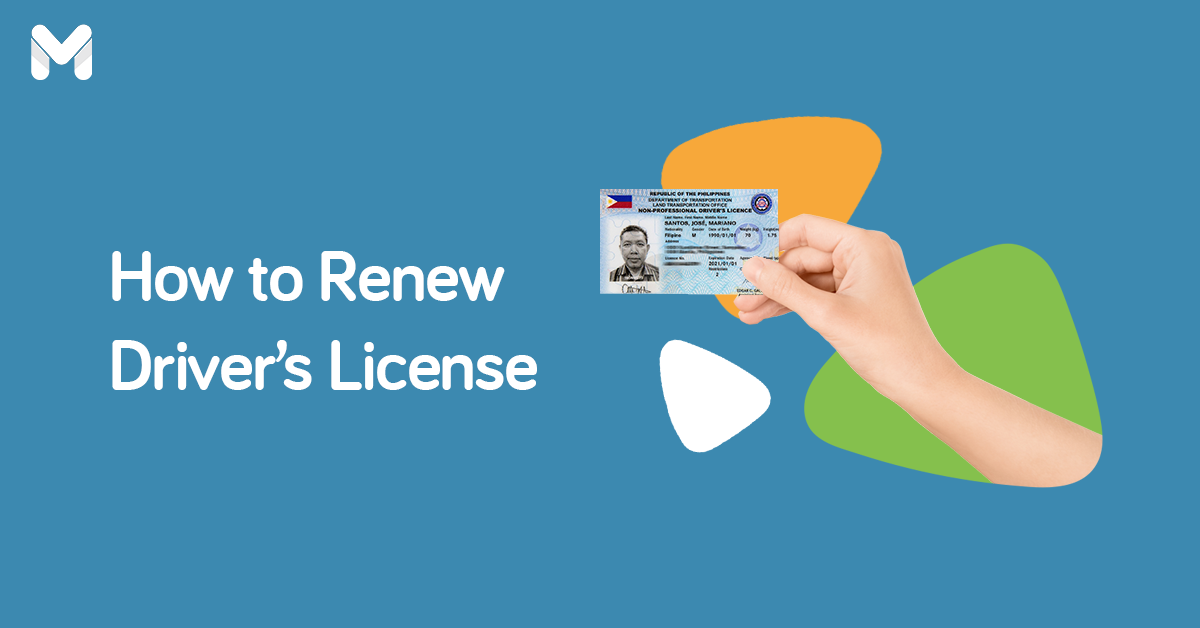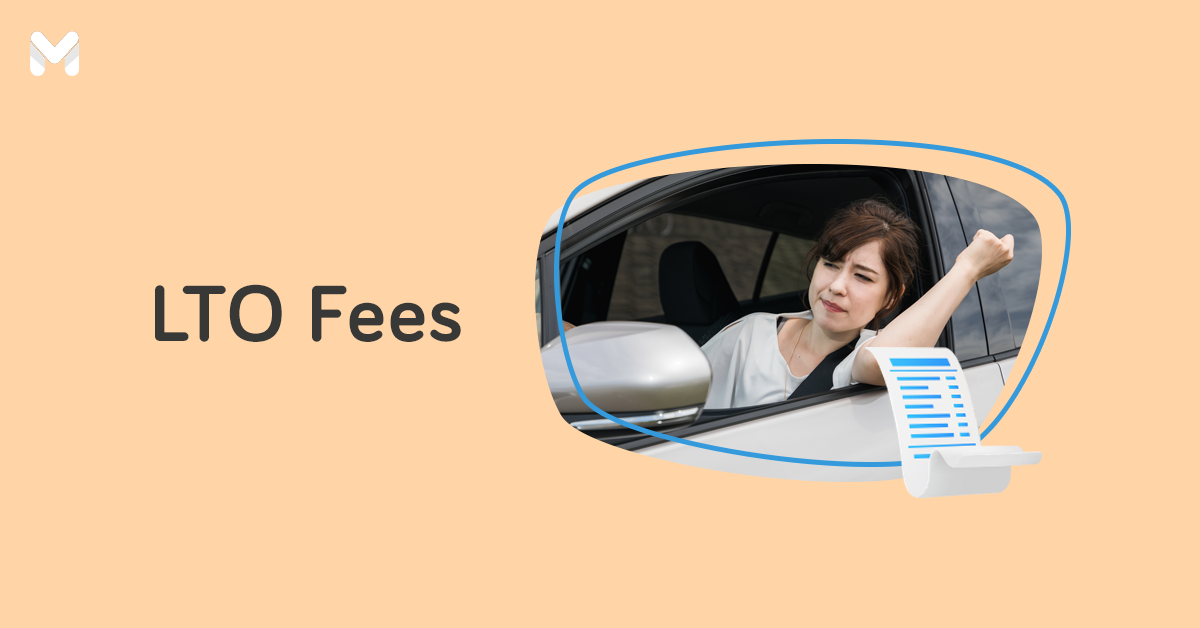Buying a car is one thing―registering it is another. Before you hit the road with your brand-new car, formalize your ownership through LTO car registration. Similarly, you need to accomplish your LTO car registration renewal if you have an existing car.
Failure to do these will result in fines and trouble with the traffic authorities.
The LTO car registration process can be quite complicated. But you can make things easier if you know where to start. Get through the system by following this step-by-step guide, which will cover the following:
- New car registration
- Renewal of registration (including registration via the Land Transportation Management System or LTMS)
LTO Car Registration Process for New Vehicles

Many car dealers in the Philippines offer a free three-year LTO vehicle registration for a newly purchased car, without additional cost to their customers. Car owners will then process the renewal on their own with the LTO three years after the initial motor vehicle registration.
When it comes to registrations processed by dealers, customers are now empowered by the LTO to monitor and report delays. According to a memorandum from the agency,[1] dealers are required to display the processing time of vehicle registration.
The said memorandum also breaks down the vehicle registration procedure with dealers into five steps:
- The owner purchases the vehicle and submits the requirements.
- Within two to three days, the dealer should process the requirements.
- The dealer should report the sale and initial registration process in one to two days.
- The LTO will register the purchased vehicle and release the license plate number and the Certificate of Registration.
- The car dealer will then contact the new vehicle owner to claim their OR/CR and license plate in one to two days.
Nevertheless, you can still do the legwork and register your brand-new car yourself. Below are the steps on how to register a car in LTO:
Step 1: Prepare the Required Documents
The following requirements are for the following vehicles: brand-new locally assembled, manufactured completely built units (CBU), imported CBUs, and brand-new local imported trailers. The same requirements also apply to electronic vehicles or EVs:
- Original sales invoice
- Original LTO copy or electronically transmitted appropriate Insurance Certificate of Cover (Third Party Liability)
- Original Certificate of Stock Reported (CSR)
- Original PNP-HPG MV Clearance Certificate and Special Bank Receipt (SBR)
- Payment Reference Number if payment is made through e-PAT
Remember that each type of vehicle has a set of additional requirements:
📋 Additional Requirement for Brand-New Motorcycle with Sidecar
Original Affidavit of Attachment for Sidecar executed by the owner and the mechanic who attached the extension, including the date of completion
📋 Additional Requirements for Tax-Exempt Vehicles
- Original duly accomplished Motor Vehicle Inspection Report (MVIR)
- Certificate of Compliance to Emission Standard (CCES) if the unit is used-imported
- Certified true copy of Release Certificate if the unit is used-imported
- DFA Endorsement
📋 Additional Requirements for Used-Imported Vehicles (Exempted from EOO 156/877)
- Photocopy of the commercial invoice or Certificate of Title with English translation authenticated by the Embassy
- Original duly accomplished Motor Vehicle Inspection Report (MVIR)
- Certificate of Compliance to Emission Standard (CCES)
📋 Additional Requirements for Vehicles Acquired Through the No Dollar Importation (NDI) Program
- Photocopy of commercial invoice of the vehicle or Certificate of Title issued by the country of origin
- Original or certified true copy of Authority Under the No Dollar Importation. If there’s no authority, Seizure Proceedings and Notice of Award will suffice
- Original affidavit of first and last importation
- Original duly accomplished Motor Vehicle Inspection Report (MVIR)
- Certificate of Compliance to Emission Standard (CCES)
- Certified true copy of Release Certificate
📋 Additional Requirements for Rebuilt Trucks and Buses (With New or Used Imported Engine and/or Chassis)
- Photocopy of commercial/sales invoice from the country of origin
- Original Affidavit of Rebuilt executed by the accredited rebuilder with the date of completion
- Original Certificate of Stock Reported (CSR) of the rebuilt vehicle
- Certified true copy of endorsement from DTI-FTEB
- Photocopy of Certificate of Payment in case the vehicle’s parts and components are imported
📋 Additional Requirements for Vehicles Acquired Through Public Bidding
- Certified true copy of the Notice of Award
- Certified true copy of Official Receipt proving the payment of acquisition cost
Step 2: Visit an LTO Office Near You
Not all LTO branches process new vehicle registrations. Below are some that do:
| LTO Branches for Car Registration | Address | Contact Number |
|---|---|---|
| LTO Navotas | Gen. Gas Plant Building, Fishport Complex, North Bay, Navotas City | 8283 3510 |
| LTO NCR-East | LTO Main Compound, East Avenue, Diliman, Quezon City | 924 6763 |
| LTO NCR-West | 20 G. Araneta Avenue, Brgy. Sto. Domingo, Quezon City | 8273 1504 |
| LTO Mandaluyong | 121 Shaw Boulevard, Mandaluyong City | 8532 2726 |
| LTO Makati | Butel Building, 9624 Pililla, Makati City | 8895 8678 |
| LTO Pasay District Office | Domestic Road, Pasay City | (+63) 960 446 2679 |
Note: Get in touch with the offices first through their phone number or social media pages before proceeding with your LTO car registration.
Step 3: Submit All Required Documents
Proceed to the transaction counter and submit all required documents to the evaluator for assessment and computation of fees.
Step 4: Submit Your MVIR
Wait for your vehicle to be inspected by an LTO officer. Submit your MVIR (Motor Vehicle Inspection Report) right after.
Step 5: Pay for the Car Registration Fees
How much will it cost to register your car with the LTO? Here’s a quick breakdown of the fees you should expect.
- Stickers and tags: ₱50 each
- Regular plate: ₱450
- Inspection fee: Up to ₱115
Take a look at LTO’s complete list regarding other fees you may need to cover.[2]
Read more: LTO Fees for Car Registration, License Application, and Violations
Step 6: Receive Your Certificate of Registration, Plates, and Stickers
Get your Certificate of Registration, plates, stickers, and other documents at the Releasing counter.
Remember that it’s necessary to register your vehicle before taking it out for a drive. LTO has a “No Registration, No Travel” policy that prohibits vehicles from traveling without a license plate. Penalties can be high, so don’t skip the LTO car registration process.
Read more: Is Your Plate Ready for Claiming? Check This LTO Plate Number Guide
LTO Car Registration Renewal Process for Existing Vehicles
You’re probably wondering, “When to renew my car registration?” Your initial LTO car registration is valid only for three years. Once it expires, you need to renew on schedule to avoid a weekly fine of ₱200. For a month's delay in payment, the fine will be 50% of the Motor Vehicle User's Charge (MVUC).
Additionally, if you get caught driving an unregistered vehicle, you’ll pay a hefty fine of ₱10,000. You’ll incur more penalties if you don’t renew your car registration right away, which is why the LTO constantly issues reminders to all vehicle owners regarding their car registration renewal.
📅 What is the Schedule for LTO Car Registration Renewal?
However, you can’t simply drive to an LTO office and apply for a vehicle renewal. So how to know when to renew your car registration?
The LTO uses a plate number-based system to determine when to renew car registration in the Philippines. The last digit of your plate number corresponds to the month you need to renew your vehicle.
| Month | Last Digit of Your Plate Number |
|---|---|
| January | 1 |
| February | 2 |
| March | 3 |
| April | 4 |
| May | 5 |
| June | 6 |
| July | 7 |
| August | 8 |
| September | 9 |
| October | 0 |
The second to the last digit of your plate number, on the other hand, corresponds to the weekly deadline for your car registration renewal.
| Week | 2nd to the Last Digit of Your Plate Number |
|---|---|
| 1st week (1st to 7th working day) | 1, 2, 3 |
| 2nd week (8th to 14th working day) | 4, 5, 6 |
| 3rd week (15th to 21st working day) | 7, 8 |
| 4th week (22nd to the last working day) | 9, 0 |
If your vehicle, for example, has a plate number of 895, your renewal deadline is from the 22nd to the 31st of May.
With this scheme, you can easily plan your renewal. There shouldn’t be an excuse, as everything is dictated by your plate number.
To avoid hassles and delays, you can also renew your car registration a month before its deadline.
📋 General Requirements
- Tax Identification Number (TIN)
- Original LTO copy or electronically transmitted appropriate Insurance Certificate of Cover (Third Party Liability)
- Duly accomplished and approved Motor Vehicle Inspection Report (MVIR)
- Photocopy of OR/CR
- Original Copy of Certificate of Emission Compliance (CEC)
- Early warning device (may be required during vehicle inspection)
Also, each type of vehicle has a set of additional requirements:
Additional Requirement for Tax-Exempt Vehicle
Original Endorsement with control number
Additional Requirement for Other Exempt Vehicle (OEV) under Special Economic Zones
Original certification that proves the motor vehicle is still classified as an OEV
Additional Requirements for Vehicles Used for Rentals (For Hire Units)
- Electronically transmitted franchised confirmation or Provisional Authority (PA) or petition for an extension of validity duly received by the LTFRB with OR
- Certified copy of the Valid Motorized Tricycle Operator’s Permit (MTOP) with Official Receipt
Additional Requirements for Stolen and Recovered Vehicles
- Presentation of the original and submission of a photocopy of the Lifting of General Alarm
- Presentation of the original and submission of a photocopy of the Report of Recovery
- Presentation of the original and submission of a photocopy of the Alarm Sheet
- Original Certificate of re-stamping in case of tampered engine/chassis
- Original PNP Crime Laboratory (macro etching report) or National Bureau of Investigation (NBI) report fully identifying the motor vehicle and stating therein the tampering done on the engine or chassis, if any
🚗 How to Renew Car Registration in LTO in the Philippines
The LTO car registration renewal process is basically the same as when you register your car for the first time. Your vehicle just needs to go through an inspection and emission test to acquire a Certificate of Emission Compliance (CEC).
Note that as per an LTO memorandum,[3] car owners no longer need to undergo engine and chassis number stenciling for plain vehicle registration renewal, provided that the vehicle passes the roadworthiness inspection and that the details on the CR match those on the vehicle.
As for the servicing LTO branch, you can renew your car registration at any LTO online district/extension office.
How to Do LTO Car Registration Renewal Online

Don't want to have to spend long hours at the LTO office just to renew your vehicle’s registration? Good news—you can now do it online via the Land Transportation Management System (LTMS) portal.
The process is quick and easy—online LTO registration renewal via the portal should take less than 10 minutes.[4]
Wondering, “How do I renew my LTO registration online?” Here’s what to do:
- Get a Certificate of Coverage (COC) from the insurance company of your choice. The said insurance company will then electronically transmit the COC to the LTMS.
- Bring your vehicle to a Private Motor Vehicle Inspection Center (PMVIC) to check its roadworthiness. The PMVIC will then electronically transmit the inspection report to the LTMS.
- Log in to the LTMS portal to start the online renewal registration of your motor vehicle. You don’t have to input the COC and PMVIC details anymore, as they’re already encoded in the form.
- Pay the fees online. The system will then generate a receipt and send it to your email.
- Congratulations, your vehicle registration is renewed!
Keep in mind, however, that the LTO registration online comes with the following conditions:
- The LTO registration renewal online is applicable only to plain renewals.
- The client should be an individual or a member of an organization with an account in the LTO portal for car registration.
- The previous vehicle renewal transaction was accomplished using the LTMS.
- The vehicle due for renewal must be linked to the registered LTMS account.
- The vehicle owner registered in the Certificate of Registration should be the current owner.
- The Certificate of Coverage (insurance) must be validated and transmitted by the Insurance Commission.
- As noted in the procedure, the inspection report must be issued by the PMVIC.
- The details of the vehicle must be updated to include the latest plate issuance.
💸 LTO Renewal Fees
The fees for LTO renewal are the same as that of the initial registration, but you also have to pay a renewal fee of ₱400.
Under Republic Act No. 8794, you also need to pay the Motor Vehicle User's Charge (MVUC), commonly known as a road user tax, when registering your car. The amount collected from MVUC will be used as funding for conducting adequate maintenance of the country’s national and provincial roads.
MVUC for Private and Government Vehicles
| Categories | Gross Vehicle Weight (GVW) | MVUC |
|---|---|---|
|
Passenger Cars (Light, Medium, Heavy)
|
|
|
|
Utility Vehicles
|
|
|
|
Sports Utility Vehicles
|
|
|
|
Motorcycles
|
|
|
|
Trucks and Truck Buses
|
4,501 kg and above
|
₱1,800 + 0.24 x GVW in excess of 2,700 kg
|
|
Trailers
|
4,501 kg and above
|
0.24 x GVW
|
MVUC for Hire Vehicles
| Categories | Gross Vehicle Weight (GVW) | MVUC |
|---|---|---|
|
Passenger Cars (Light, Medium, Heavy)
|
|
|
|
Utility Vehicles
|
Up to 4,500 kg
|
0.30 x GVW
|
|
Sports Utility Vehicles
|
|
|
|
Motorcycles
|
With Sidecar |
₱300
|
|
Trailers
|
4,501 kg and above
|
0.24 x GVW
|
MVUC for Aged Private Vehicles
| Categories | Gross Vehicle Weight (GVW) | MVUC |
|---|---|---|
|
Light cars
Models from 1995 to 2000
Models from 1994 and older
|
|
|
|
Medium cars
Models from 1997 to 2000
Models from 1995 and 1996
Models from 1994
|
|
|
|
Heavy cars
Models from 1995 and older
Models from 1994 and older
|
2,301 kg and above
|
|
LTO Inspection Process for MVIR

One of the most important requirements in the LTO car registration renewal process is the Motor Vehicle Inspection Report (MVIR). Below is the inspection process for securing an MVIR.
Step 1: Submit Your Documents to the LTO Receiving Clerk
Provide the original copy or photocopy of your Official Receipt (OR) or Certificate of Registration (CR). You also have to submit your Certificate of Public Convenience (CPC) or Order for Dropping and Substitution (Change Classification) if your vehicle is for hire.
Step 2: Pay the Corresponding Fees
Per the Department of Transportation (DoTr), the cost of a vehicle inspection should be the same as that of an emission test given by a private emission testing center. This means that the fee will depend on the testing center of your choice.[5]
Step 3: Undergo Vehicle Inspection
An inspector will take a look at your vehicle and conduct an emission test for the inspection report. An approving officer will confirm the accuracy of the report.
Step 4: Receive Your Inspection Report and Requirements
Head over to the releasing clerk to accept your MVIR and returned requirements. If you fail the inspection report, you’ll be asked to correct your vehicle’s defect and return for re-inspection.
Important note: Motorists are given the option to have their vehicle inspected either by a private inspection center or by the LTO. Should you go for the former, make sure they are truly accredited and authorized by the LTO.
LTO Car Registration and Renewal Tips
Manage your expectations and curb the stress of LTO car registration and renewal with the following helpful pointers:
- Before you go to any LTO branch, make sure you have an LTO Client ID as proof that you've successfully registered to the LTMS public portal. Note that using the LTO portal for car registration is free of charge, so don’t engage with anyone offering to do it for you for a fee.
- Be early. It’s best to come before 8:00 a.m. to avoid long lines. Note that some applicants go to the LTO as early as six in the morning.
- Don’t forget to bring your early warning device (EWD). The EWD is a mandatory car accessory (except for motorcycles and tricycles). You might be asked to show it during your vehicle inspection.
- Keep your car in good running condition to prepare it for inspection.
- Hold on to your documents and receipts to avoid delaying the process.
- Avoid fixers or individuals impersonating or claiming to be LTO officers. Otherwise, you may face legal repercussions.
- Prepare loose change for the photocopier.
- Bring your own pen.
- Bring a book or an entertainment device to pass the time.
LTO Car Registration and Renewal: FAQs
-Mar-02-2023-10-14-41-3836-AM.png?width=620&height=413&name=Pics%20for%20blog%20-%20600x400%20(1)-Mar-02-2023-10-14-41-3836-AM.png)
Got more questions on LTO car registration and renewal? Check out the following before heading out:
1. Is online registration renewal mandatory?
No. If you're confused with the process and would prefer to sort everything out in person, you can still go to your preferred LTO district office.
Related reading: Driver’s License Renewal Requirements and Process in 2025
2. I'm about to renew my car registration online for the first time. Can I do so on my own?
As mentioned above, the last vehicle renewal transaction must be accomplished using the LTMS. If you're new to to online registration renewal process, you'll have to head over to any LTO district office first. The next time your car is up for renewal, you can proceed on your own.
3. What are the LTO fast lanes for unregistered vehicles?
Under the agency's goal to register 2.7 million unregistered vehicles in the country, LTO Chief Assistant Secretary Vigor Mendoza II ordered all LTO offices to create a special "fast lane" where delinquent owners (i.e., those with expired registration for at least one year) can register their motor vehicles.[6]
4. Do I still need TPL if I already have comprehensive insurance?
No,[7] since comprehensive insurance already has TPL coverage. Remember this when renewing your vehicle registration!
5. Can I change my plate number?
Unfortunately, changing your plate number isn’t allowed. According to law, the identification and letters of any plate number of a motor vehicle are permanently assigned to the said motor vehicle during its lifetime. Change of plate number will be only accepted when there is a change of denomination/classification (e.g., change of private vehicle to rental or government vehicle to private).
Related: LTO Vanity Plate: The Pros and Cons of Customizing Your Plate Number
6. How to check if the OR/CR of a second-hand vehicle is authentic?
To check the authenticity of a secondhand vehicle’s OR/CR, just go to the LTO Property Section at East Avenue, Quezon City.
Read more: How to Transfer Car Ownership in the Philippines with the LTO
7. Can I get a duplicate OR/CR if I lose my own copy?
Yes. But first, you need to obtain a notarized affidavit of loss. After that, head to your originating district office and present the said affidavit. Remember that the originating district office is the LTO office where the vehicle was first registered.
You’ll also need to bring two valid IDs for identity verification. Once all the requirements are validated, the originating district office will issue you a duplicate OR/CR.
8. How to get a replacement for my lost sticker and a duplicate plate?
Just present the following requirements to any LTO branch:
- Original copy of Affidavit of Loss/Mutilation
- Original CR or Certified True Copy of CR
- Original OR of late payment of MVUC and other fees or Certified True Copy of OR
- Proof of Payment (OR) for the cost of the replacement plate, duplicate plate, or lost sticker
- Approved Motor Vehicle Inspection Report (MVIR)
- For sole proprietorship, Secretary’s Certificate in case the vehicle is in the name of a corporation or DTI certificate
- For Rentals (For Hire vehicles), certification from LTFRB proving that plates haven’t been surrendered
- PNP-HPG clearance
Final Thoughts
The LTO car registration and renewal process can be quite complicated. But it’s nice to know that the bureau is taking steps to streamline the process and make it less burdensome.
For instance, the LTMS provides a channel where you can renew your car registration. You no longer need to fall in line at an LTO branch just to apply for a vehicle renewal. If it’s any consolation, this move indicates that the agency is set to revamp the traditional system.
You may still experience some inconvenience due to the complicated bureaucracy. But that is not an excuse to resort to under-the-table dealings. You don’t want to get ahead of others with an unfair advantage—you might run into legal repercussions along the way.
🚗 Get a Free Car Insurance Quote
Looking for car insurance? Below is a list of top car insurance companies and their features. Compare your options and get a free quote from Moneymax!
| Car Insurance Company | Maximum Total Sum Insured | CTPL Coverage | Own Damage & Theft Coverage | Acts of Nature Coverage | Death / Disablement Coverage |
|
FPG Insurance
|
₱4 million
|
✔️
|
✔️
|
✔️
|
|
|
Malayan Insurance
|
₱7.5 million
|
✔️
|
✔️
|
✔️
|
|
|
The Mercantile Insurance Corporation
|
₱5 million
|
✔️
|
✔️
|
||
|
OONA Insurance (formerly MAPFRE)
 |
₱5 million
|
✔️
|
✔️
|
✔️
|
✔️
|
|
PGA Insurance
 |
₱3 million
|
✔️
|
|||
|
SGI Philippines
|
₱5 million
|
✔️
|
✔️
|
✔️
|
|
|
Standard Insurance
|
₱5 million
|
✔️
|
✔️
|
✔️
|
✔️
|
|
Stronghold Insurance
|
₱3 million
|
✔️
|
Sources:
- [1] Car dealerships must display registration processing time: LTO (Philippine News Agency, 2023)
- [2] Motor Vehicle Registration
- [3] Engine, chassis number stencils no longer required for vehicle registration renewal (ABS-CBN News, 2023)
- [4] New LTO System Makes Car Registration Renewal a Breeze (The Manila Times, 2023)
- [5] Motor Vehicle Inspection Mandatory Before Renewal of Registration (Manila Times, 2021)
- [6] 'Fast lanes' to be created in LTO offices for unregistered vehicles (Philippine News Agency, 2023)
- [7] LTO junks TPL as registration requirement if vehicle owner has comprehensive insurance (Malaya Business Insight, 2023)










